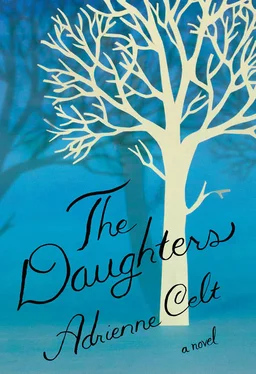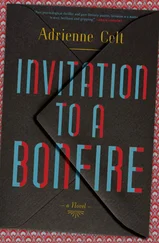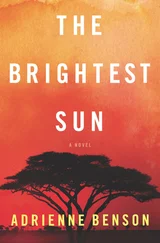“I think,” he says, “that you’ve been drinking. You always get like this.” He picks up Kara, turns a slow circle while holding her above his head and smiling. Then he looks back at me. “Unreasonable.”
He walks to the kitchen and I can hear him take out a bottle of formula that we have on hand in case we want to go out to eat and have a drink, just relax together. Something untarnished for the baby. With her in his arms, he goes into the bedroom and gently, so as not to scare her, closes the door.
We are still frightened, then. Both of us.
Everything about me depends on Greta. That’s what Ada told me, what she needed to be true. With every word and every flick of the wrist, she made me into something as fragile and hard as cut glass. A lens, through which she could see the world she wanted.
“You are the finest creature yet born,” she said to me each morning. We had a ritual: Baba Ada woke me up at seven, and the first thing she did was brush my hair. Light spilling through the curtains in the summer, a soft lamp turned on to help us see in the winter, when the sun was barely up by the time she cracked open the door. My baba Ada sat on the edge of my bed and wrapped the comforter around me, drawing me towards her and kissing the top of my head.
“You are my golden girl, złota moja, lalka .”
The brush was brown wood, with many hard bristles, like a horse brush. It brought me into my body. My first sensation on any given day was the sudden sharp pressure of those bristles on my scalp, and the slow tugging that followed them. I let my head fall to the side Ada was brushing, and she tilted me straight with two fingers on my chin.
“You’re growing so beautiful. Every day.”
She said this to me when I was three, four, five; she said it to me on my fifteenth birthday, when I lay in bed with my colt legs tucked under me. At seventeen I decided the routine left no room for my personal expression and began sleeping naked. It made no difference. In fact, my baba never even mentioned it. She came into my room and brushed my hair a hundred strokes, then stood me up on bare and wobbling knees and led me to the closet to choose between my dresses.
“Before me,” Ada told me, “Greta was lonely for a daughter. And when I was born she wept for ten days. As I grew up, she brushed my hair every morning to spin it into silk, and to teach me how to someday brush your hair for you. She understood what a treasure you would be. She dreamed of you even though she had to wake up every morning into a world without you.”
The night before Kara was born — not that I knew it, then — I lay in bed with the covers pulled up to my knees and chatted with her through my skin. I wanted to prepare her for coming into the world, explain that I would be gone sometimes for tours but that someone would always be at home to take care of her. I told her that she would resent the way adults treasured her childhood, would always be indignantly trying to explain that her life was difficult, too, and could we please just acknowledge that?
“But we’ll have our reasons,” I told her. “You’ll have something we all want and can’t have, and we’ll be so jealous of you that sometimes we’ll feel like blowing up.”
In my dreams, until I was six or seven years old, I lived with Greta in her small cottage at the edge of the woods. When I wanted to be alone, I sat on a footstool in the corner of the kitchen so that I could be near the fire but also smell the sharp resin of the wooden walls. The footstool was covered in scratchy brown wool. Greta reached into the stove and took out fistfuls of flame with her bare hands.
She and I stared at these balls of fire, asked them questions as if they were tiny stars come down to visit. You must have seen so much , we said.
Each time I learned a new song I rushed to sleep, to Greta, and sang it for her. Each time I coaxed my voice towards a new high note, I saw her eyes shining with pride. We walked through her Poznań township hand in hand, and the people on the street parted ways for us — they shifted the sea of their movements to let us through, and we walked as though on the sandy floor of the ocean, marveling at all that was around us. Sometimes Greta pointed up to the sky and said, Look! And a bird flew past so fast that no one but us noticed it obscure the sun. Just for a moment. The bird’s wings a black cape across the clouds.
“We’ll want to see what you see,” I told Kara. At that moment her eyes were shut against their gentle bath, the warm water I stored for her within me. She saw geometric combinations, Escher portraits of the sounds on the other side of her swaddling wall. Or maybe she saw nothing, since she hadn’t yet the experience to know that there are shapes to name and colors to fill the shapes in and make them shine.
As I grew older, Greta’s cottage receded from me; the weight of her hand on my own diminished. When Ada told me the stories of her mother’s life, all I saw was that they explained who I was supposed to be. I didn’t see the knots in the floorboards anymore or the mammoth iron mouth that was Greta’s cookstove. And I only had a faint, haunting memory of the last trip Greta and I took out to the forest, when she helped me climb up into a tree and together we hummed the river’s song. I had some notion of the person who happened towards us and, hypnotized, scrambled up the tree to sit beside us.
That person was, I thought, my mother, Sara, with her dark hair and her almond eyes. She took our hands in her own and lifted to each of our lips a crust of bread fresh from the oven, watched me chew and swallow and open my mouth for another. And she looked at me, looked so reproachfully, when from either side Greta and I leaned in to kiss her cheeks. I remembered faintly the way the color drained from my mother’s face and how her body fell like a rag to the forest floor. She got up and brushed herself off, walked away, but I could see that something was missing from her from that moment, and that I had taken it for myself.
“Now you’ll be strong,” Greta told me. “Like I was.”
I put my hand on my belly and could feel through the taut skin the basic outline of a foot. I inspected it for toes and searched for a heel, but everything was still too indistinct, too much a part of me. Kara was sleeping, soothed by who knows what. The sound of my heart? The thrum of my blood? Something nourished and protected her. Some piece of me that lay beyond my control.
As I learned at the age of four — leaning my rib cage against the window sash and stretching my neck into the dirty Chicago air — sound is a product of its environment. Anyone can test this with a pop bottle and a small amount of embouchure control: flatten your lips and blow across the top of the bottle. When it’s full you get a whistle. As you drink the soda down, the sound deepens.
The principle is just as true inside your body as out in the world — a soprano is born, and you can see it in her silhouette. More often than not she’s small, like me. Her thin neck means that her vocal cords are slender and tightly packed together. They resonate at a high frequency when air rattles through them. Her jaw is strong, the mouth an echo chamber. Every tuck and fold a part of the instrument.
As a singer you have to be careful with your body the same way you’d be careful transporting crystal or glass. When the temperature varies too drastically, molecules shift and expand. Things shatter. The pen in my purse spills ink everywhere during altitude changes; and after plane rides longer than two hours, I need to avoid citrus fruits for a week, drink only herbal tea.
Travel, then, has always been dangerous for me. It can affect a performance in unexpected ways — hemming my voice in with static from the dry velveteen seats on the train into a new city, and desiccating it with the train’s hot, recirculated air. High elevation breaks sounds into brittle sheets of paper; the color and texture of grain bins in a city’s street markets bleed through into my tonal quality. Resonance comes from a barrel of smooth red quinoa seeds you can stick your hand in up to the elbow. Sharp color from hard, ridged bulgur wheat. Airiness from vats of flour that feels like silk when you lay your palm on top — if the frowning merchant will let you handle his wares so freely.
Читать дальше












